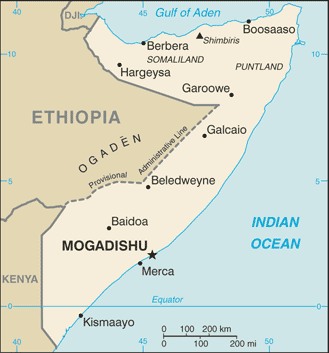The prime minister of the government of Somalia, which has control over parts of the capital Mogadishu, promised the West a share in its oil riches in exchange for security and reconstruction in an interview this week.
 Significant oil reserves have been discovered in Somalia, and after drilling it is expected to successfully flow within weeks, with the crude reaching the north-east corner of Somalia by April. Somali diplomats say that an offensive against the al-Shabab militant group in the south, backed by U.S. drone strikes, should take.
Significant oil reserves have been discovered in Somalia, and after drilling it is expected to successfully flow within weeks, with the crude reaching the north-east corner of Somalia by April. Somali diplomats say that an offensive against the al-Shabab militant group in the south, backed by U.S. drone strikes, should take.
Prime Minister Abdiweli Mohamed Ali, speaking to a British newspaper after meeting Secretary of State Hillary Clinton and British Prime Minister David Cameron at a conference last week, said “There’s room for everybody when this country gets back on its feet and is ready for investment,” he said. “Although now is not the time. What we need is capital from countries like the UK to invest. If the private sector can come in and do the work, then we welcome them.”
Prime Minister Abdiweli Mohamed Ali recently pushed for “targeted airstrikes” by the international community, and while Clinton has publicly spoken against it, U.S. drone strikes in Somalia are a well known fact.
But stepped up foreign interference seems to be the last thing Somalia needs. Somalia is still stuck in two decades of civil war and now has renewed focus from the weaponized West after an official merger with al-Qaeda. The mandate for Somalia’s transitional government expires in August.
“There’s already a lot of scepticism from parts of the Somalian community about the reasons for the sudden focus on Somalia,” said Chatham House analyst Adjoa Anyimadu. “The potential for things to go wrong is high, for the population to feel they are being undermined or invaded by foreigners. Al-Shabaab has little credence with many Somalians but a foreign intervention could create a common enemy.”
The U.S. is giving weapons, intelligence, and legitimacy to thugs and murderous warlords in Somalia, some of whom used to be fighters for the very militants the U.S. now has them fighting against. The U.S. has also backed African Union troops and the Kenyan military in their fight against al-Shabab.
“One can legitimately argue that … Somalia’s enduring ‘failed state’ existence has been because of international community involvement, the precise opposite of Cameron’s argument that it has been ignored,” said Hannah Waddilove, Africa analyst with security firm AKE.
But even the Obama administration has quietly acknowledged the fact that their military involvement in Somalia may create more problems than it solves, with one administration official telling the Washington Post in December there is a “ concern that a broader campaign could turn al-Shabab from a regional menace into an adversary determined to carry out attacks on U.S. soil.” Nevertheless, the U.S. appears only to be doubling down.


